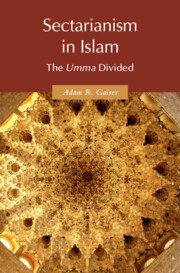Book contents
- Sectarianism in Islam
- Themes in Islamic History
- Sectarianism in Islam
- Copyright page
- Dedication
- Contents
- Figures and Maps
- Preface
- Note on Transliteration, Dates, and Qurʾanic Citations
- 1 Introduction
- 2 History, Sects, and Schools
- 3 Protest and Piety
- 4 Devotion to the Family of the Prophet
- 5 Muslim Schools of Thought
- 6 Emulating the Prophet and Cleaving to the Community
- 7 Sectarian Ambiguities, Relations, and Definitions
- 8 Conclusions
- Glossary
- Bibliography
- Index
8 - Conclusions
Published online by Cambridge University Press: 10 November 2022
- Sectarianism in Islam
- Themes in Islamic History
- Sectarianism in Islam
- Copyright page
- Dedication
- Contents
- Figures and Maps
- Preface
- Note on Transliteration, Dates, and Qurʾanic Citations
- 1 Introduction
- 2 History, Sects, and Schools
- 3 Protest and Piety
- 4 Devotion to the Family of the Prophet
- 5 Muslim Schools of Thought
- 6 Emulating the Prophet and Cleaving to the Community
- 7 Sectarian Ambiguities, Relations, and Definitions
- 8 Conclusions
- Glossary
- Bibliography
- Index
Summary
The conclusion reemphasizes some of the main points of the book: that sectarian identities are not fixed, but remain fluid and adaptable to different situations. As such, they present grand narratives that human beings can emplot themselves within, and orient themselves accordingly. The chapter also notes how sect and school narratives seem to encompass notions of salvation. Similarly, human beings might adapt and develop the grand narratives to fit their own situations, thereby contributing to the history and accumulating tradition of any given sect or school. The medieval figure of al-Ghazālī is given as an example of such a reformer.
- Type
- Chapter
- Information
- Sectarianism in IslamThe <EM>Umma</EM> Divided, pp. 185 - 191Publisher: Cambridge University PressPrint publication year: 2022

